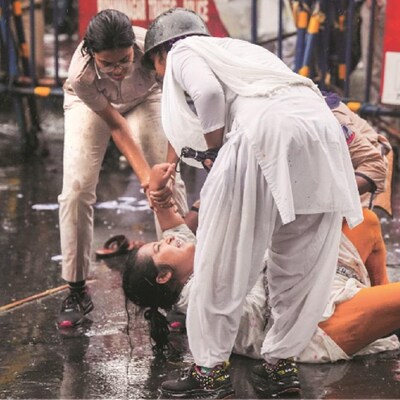)
Police personnel detain an ABVP activist during a march to Swasthya Bhavan in Kolkata on Tuesday, in protest against the rape and murder of a trainee doctor | Photo: PTI
Amid nationwide protests by doctors over the rape and murder of a 31-year-old resident doctor at Kolkata’s RG Kar Medical College and Hospital, the Supreme Court (SC), which took suo motu cognizance of the case, constituted a 10-member national task force (NTF) on Tuesday.
The task force, comprising senior doctors, will develop a national protocol to ensure the safety and facilities for health care workers at their workplaces. This could potentially lead to major reforms in the working conditions for medical practitioners and paramedics across the country.
The three-judge Bench, led by Chief Justice of India (CJI) D Y Chandrachud, said, “We are establishing an NTF with doctors from diverse backgrounds who will propose modalities to be implemented nationwide to ensure that safety conditions are maintained and that doctors, whether young or middle-aged, are safe in their work environments.”
The Bench directed the task force to examine and recommend measures for the safety and well-being of medical professionals. It was also ordered to prepare a national action plan for preventing gender-based violence and ensuring safe and dignified working conditions for interns, resident doctors, and non-resident doctors.
The task force has been asked to submit an interim report within three weeks and a final report within two months of the order.
Prominent members of the task force include Surgeon Vice Admiral R Sarin, director general, medical services (Navy); Dr M Shreenivas, director, All India Institute of Medical Sciences (AIIMS), New Delhi; and Dr Pratima Murty, director of the National Institute of Mental Health and Neurosciences, Bengaluru; along with seven other members.
The task force will also include four ex-officio members: Cabinet secretary, health secretary, chairperson of the National Medical Commission, and president of the National Board of Examiners.
The court has asked the central government to compile information regarding the number of security guards, resting rooms, and police outposts and submit it in an affidavit within one month.
The SC has instructed the Central Bureau of Investigation to submit a status report by the next hearing, scheduled for August 22.
The action plan will consider areas such as whether emergency rooms need additional security; restricting access to non-patients; baggage screening to prevent weapons from entering hospitals; transport for medical professionals from 10 pm to 6 am; and the provision of restrooms and gender-neutral spaces for doctors and nurses. The CJI also mentioned the importance of workshops for mental well-being and emergency helplines for medical personnel.
This follows the SC’s suo motu cognizance of the Kolkata rape-and-murder case last week. CJI explained, “We decided to take suo motu action, despite the high court’s involvement, because this is not just a case of a horrific murder at a Kolkata hospital; it is a systemic issue regarding the safety of doctors across India.”
Amid the SC’s order to form a task force for the safety of health care professionals, the Union Ministry of Health and Family Welfare wrote to central government-run health care institutions on Tuesday. The letter advises these institutions, including AIIMS, to enhance security measures for all health care personnel on their premises.
The ministry’s letter highlighted long-standing concerns about the increased vulnerability of government hospitals to unauthorised entry and suggested security measures to mitigate the risk of violence against health care workers.
“While accessibility is important for providing care, it can also pose security risks,” the letter said. It emphasised the need for a comprehensive security approach that balances accessibility with effective measures to protect patients, staff, and the facility’s integrity.
The ministry’s security plan includes installing closed-circuit television cameras at strategic locations, employing additional security guards, and displaying relevant penal provisions of state legislation to prevent violence against health care workers within hospital premises.
The ministry also stressed the importance of staff training, urging all central government-run institutions to provide adequately secured duty rooms with basic amenities for women health professionals.
Medical bodies back SC order; strike on until protection Act
Medical bodies and resident doctors’ associations (RDAs) welcomed the Supreme Court’s (SC’s) decision to form a task force to ensure the safety of health care workers at their workplaces.
The Indian Medical Association (IMA) held a meeting with state presidents and secretaries on Tuesday to determine the next steps.
Similarly, while welcoming the apex court’s order, the Federation of All India Medical Association said that it had a meeting with all associated RDAs and decided to continue protests until a central protection Act for the safety of health care professionals is enacted.
This follows the SC’s request for doctors to resume work. The Court noted that the abstention of doctors from their duties impacts those segments of society in need of medical care.
First Published: Aug 20 2024 | 9:37 PM IST
